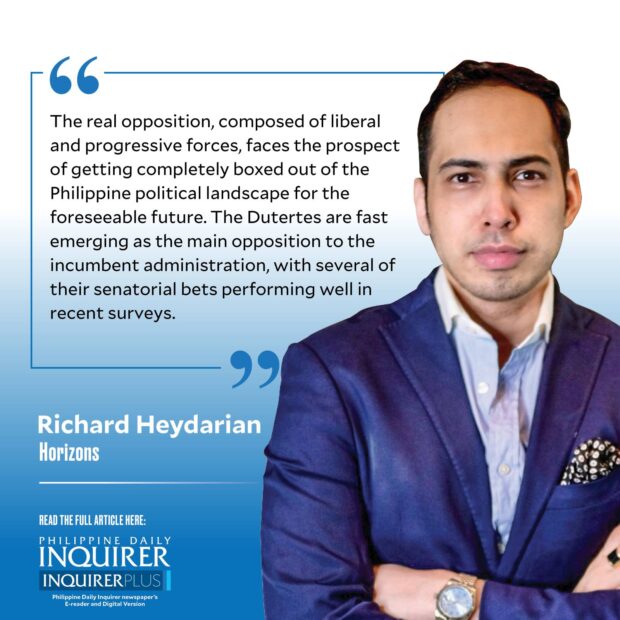2024: The opposition after ‘UniTeam’

Never interrupt your enemy when he is making a mistake,” counseled the French Emperor Napoleon Bonaparte. The virtual disintegration of the “UniTeam”—an alliance of inconvenience between the House of Marcos and the House of Duterte—has made the Napoleonic dictum particularly attractive to liberal-progressive observers.
Whenever I post anything about the latest plot twist in the slow-motion dismantlement of the UniTeam, the emoji that keeps on popping up in the comments section is popcorn. In many ways, schadenfreude has become the visceral response of countless disillusioned Filipinos, who refused to accept or welcome the victory of Marcos-Duterte axis in last year’s elections.
It’s a particularly understandable sentiment. While the former demagogue from Davao unabashedly mocked and maimed our democratic institutions, the emphatic victory of Ferdinand Marcos Jr. in last year’s elections was a slap on the face of both Edsa I and Edsa II veterans.
Article continues after this advertisementNot long ago, countless liberal observers lamented the prospect of a thousand years of Marcos-Duterte dyad, with Sara Duterte supposedly succeeding Marcos Jr. in 2028, then another Ferdinand Marcos likely taking her place after another six years—and ad infinitum. It was a dangerously intoxicating form of cynicism, which only fueled bitterness and defeatism among some liberal partisans.
But as in everything in Philippine politics, life imitates art. Barely a year into President Marcos’ term in office, there was a plot twist. The former president and his diehard supporters ramped up their attacks on the incumbent administration’s key policies, most notably on the West Philippine Sea and China. It didn’t take long before the incumbent Vice President, another Duterte, was dragged into the intensifying conflict, culminating in the removal of her indispensable confidential funds.
This triggered a new round of spats, which saw no less than the pro-Duterte Sonshine Media Network International media channel emerging as a primary source of opposition to the administration’s key policies. The political infighting was mirrored online: Once unified illiberal bloggers, who formed the information warfare backbone of Dutertismo, split into competing camps and began lashing out at each other with distinct toxicity. In a bizarre twist of events, the Duterte camp steadily emerged as an unlikely “opposition” force against the Marcos administration.
Article continues after this advertisementBut, dear readers, self-indulgent passivity in face of the UniTeam disintegration is a recipe for disaster. The real opposition, composed of liberal and progressive forces, faces the prospect of getting completely boxed out of the Philippine political landscape for the foreseeable future. The Dutertes are fast emerging as “the” main opposition to the incumbent administration, with several of their senatorial bets performing well in recent surveys. And Sara Duterte remains as the favorite candidate for presidency in the next election cycle. Should the pro-Marcos camp dominate next year’s midterm elections, however, they will likely try to prevent the return of the Dutertes to Malacañang by changing the Constitution altogether.
Undoubtedly, the incumbent is a smooth operator. Last year, he expressed skepticism about constitutional change, even if he ran under an avowedly pro-federalism party. He largely skipped any discussion of constitutional change in his first two State of the Nation Addresses, partly to appease Western partners and disarm liberal critics at home.
But as the UniTeam infighting gained steam, Mr. Marcos reinjected the constitutional change issue into his core policy agenda. His right-hand man in Congress, meanwhile, made it clear that constitutional change will be a top priority in 2024—and likely a reality after the midterm elections.
History shows that politics is no friend of any ex-president in the Philippines, unless the successor is a trusted ally. Under a parliamentary system, Mr. Marcos can engineer a smooth transition by mobilizing sufficient party-based support to a preferred successor, who may not even need to have presidential charisma.
This is why it’s extremely important for the real opposition to, against all odds, mobilize support for a few competitive candidates for top legislative positions, especially in the Senate. Surveys show that liberal leaders such as Francis “Kiko” Pangilinan, Benigno “Bam” Aquino, and Leni Robredo will be competitive candidates. Otherwise, Sen. Risa Hontiveros will be the only major legislator left to scrutinize any politically motivated constitutional change move next year. What’s at stake is the soul of Philippine democracy.
—————-
rheydarian@inquirer.com.ph
















